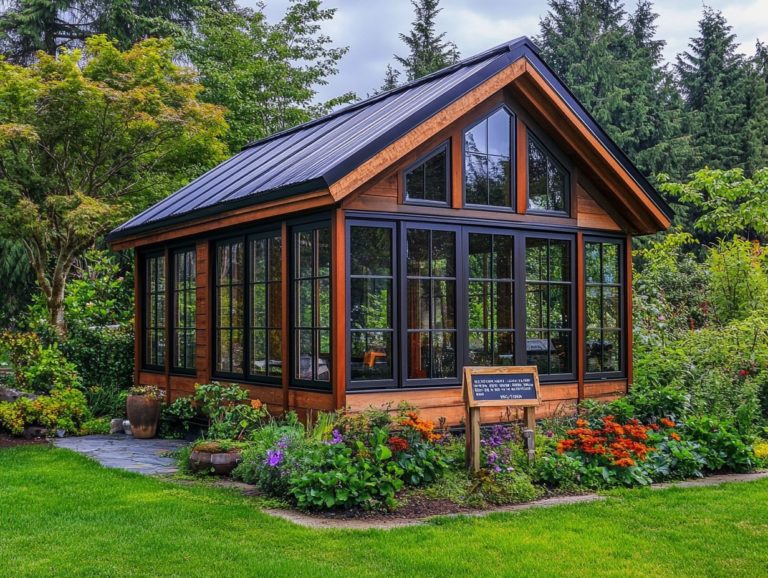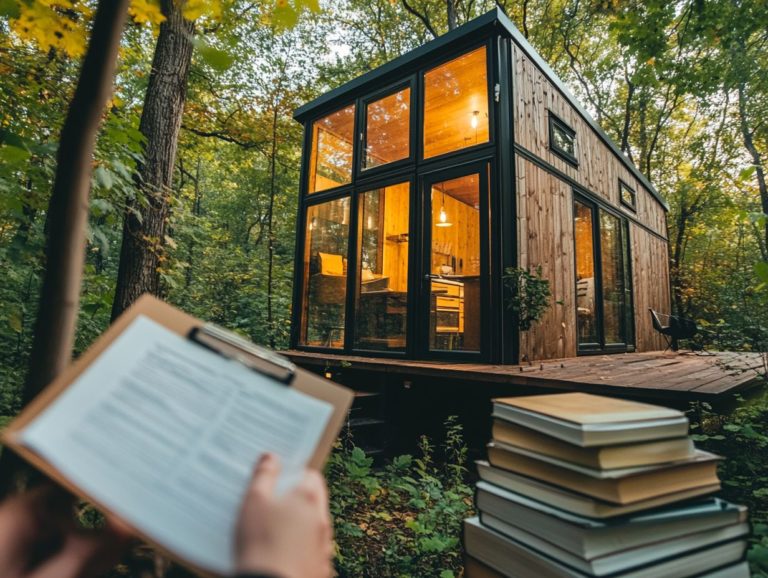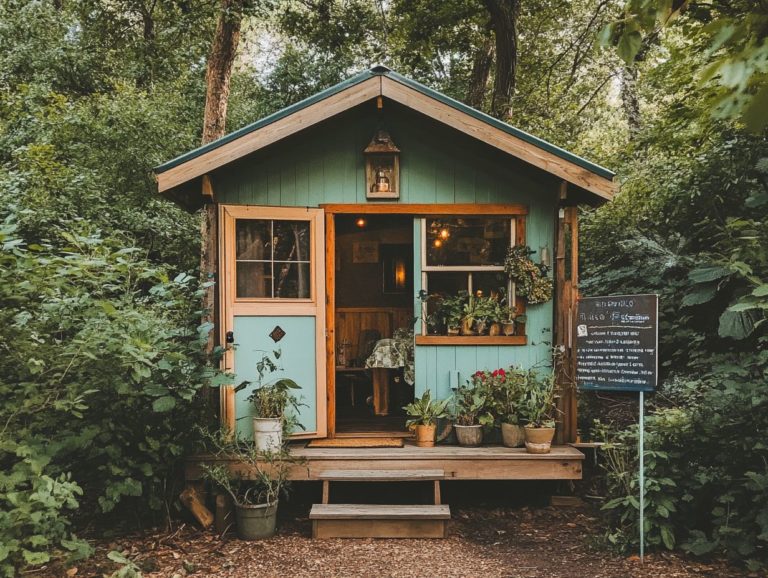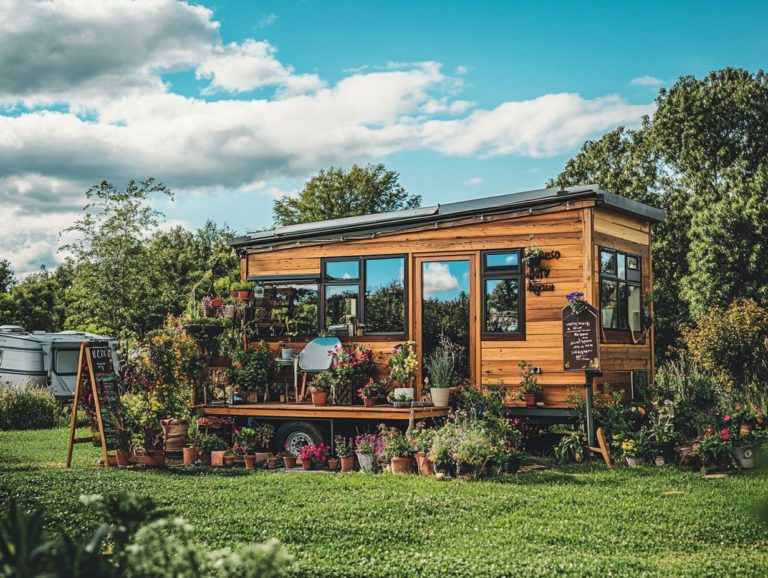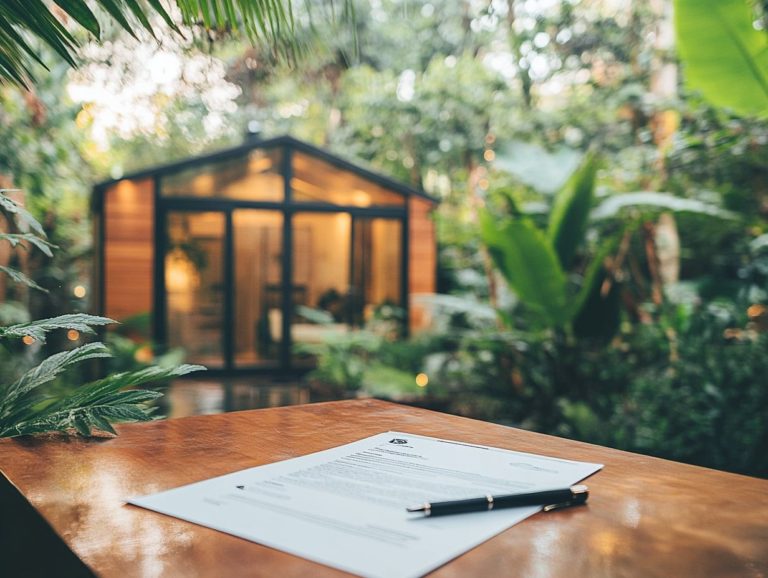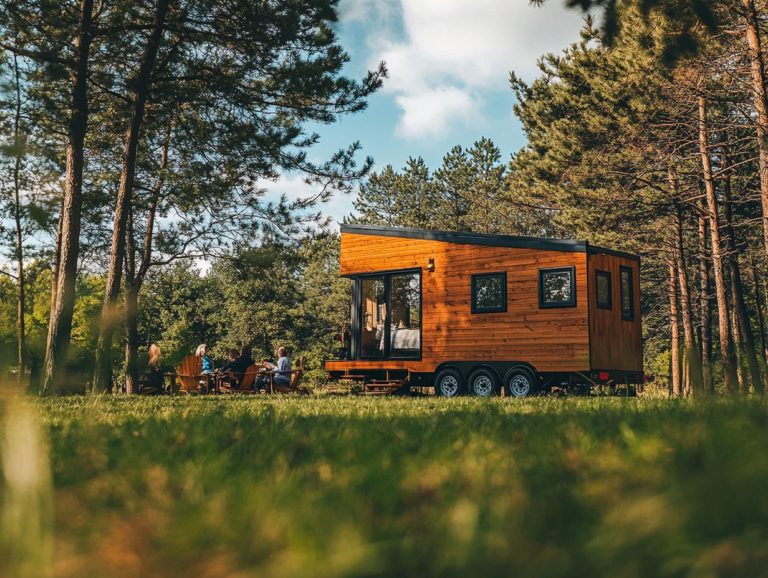How to Legally Place Your Tiny House on Wheels
Curious about the tiny house movement? A tiny house on wheels offers an exciting chance to break free from traditional housing and embrace affordable living! This article explores the benefits of owning a tiny house, while also covering crucial legal considerations, such as local laws that dictate where you can place your tiny house and the necessary permits.
This journey will guide you through the practical steps needed to legally position your tiny home. You ll also discover alternative living options within thriving tiny house communities and RV parks.
Immerse yourself in this exploration and uncover how this sustainable living lifestyle can transform your world!
Contents [hide]
- Key Takeaways:
- Benefits of Owning a Tiny House on Wheels
- Legal Considerations for Placing a Tiny House on Wheels
- Steps to Legally Place Your Tiny House on Wheels
- Alternative Options for Tiny House Living
- Frequently Asked Questions
- 1. Can I legally place my tiny house on wheels on any type of land?
- 2. Are there specific zoning regulations for placing a tiny house on wheels?
- 3. Do I need a permit to place my tiny house on wheels on my property?
- 4. Can I place my tiny house on wheels in a backyard or as an extra living space?
- 5. Are there any specific building code requirements for a tiny house on wheels?
- 6. Can I legally live in my tiny house on wheels full-time?
Key Takeaways:
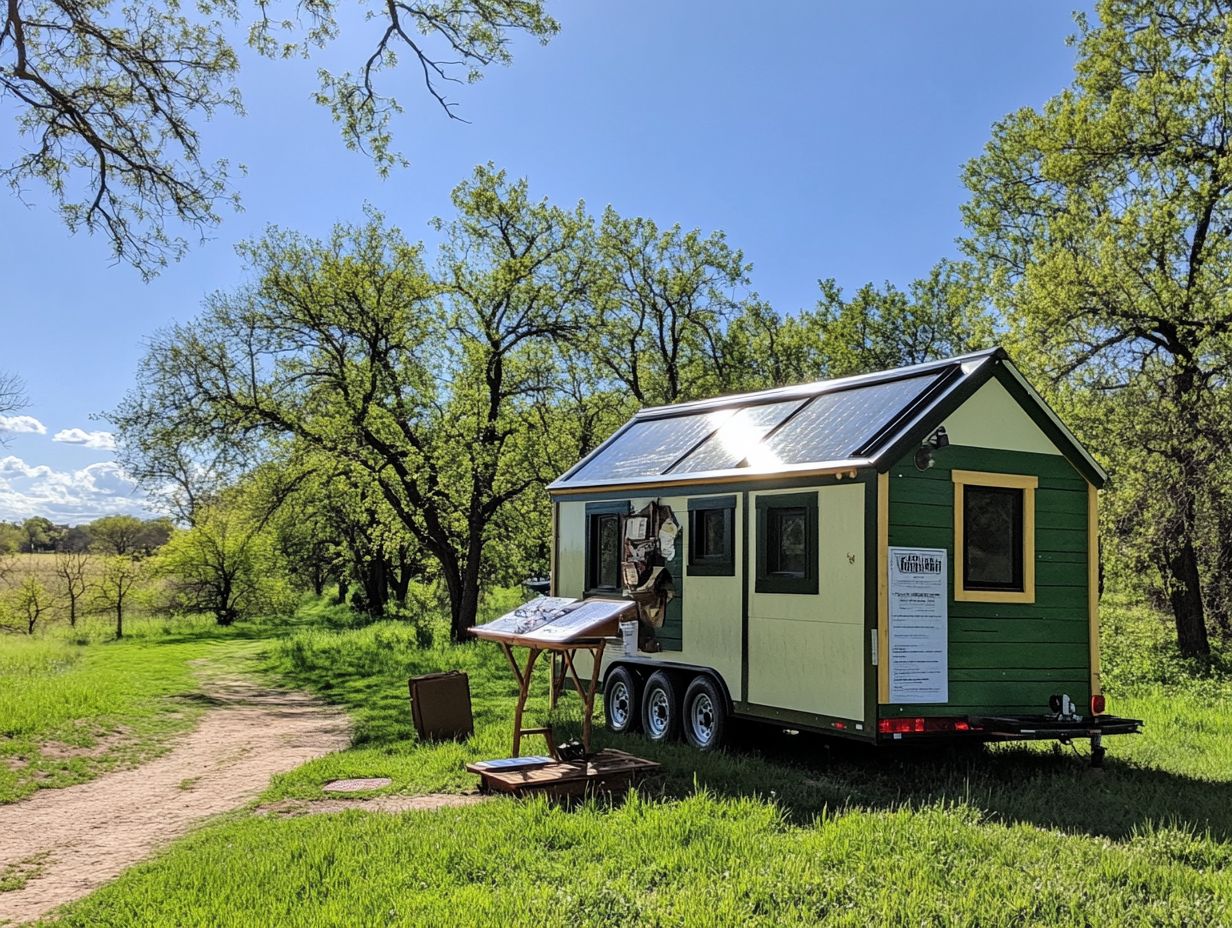
- Owning a tiny house on wheels can provide financial and lifestyle benefits such as reduced expenses and increased mobility, particularly when considering the compact size of these small dwellings.
- Before placing a tiny house on wheels, it is important to research and understand local zoning ordinances and building codes, as well as obtain necessary permits from local authorities.
- Alternative options for tiny house living include renting or buying land, engaging with local tiny house communities, or considering transitional structures like mobile homes.
What is a Tiny House on Wheels?
A tiny house on wheels is your ticket to a compact yet fulfilling lifestyle, allowing you to embrace minimalistic living while still enjoying the comforts of home. These charming dwellings are typically built on a trailer foundation, giving you the freedom to move wherever your heart desires.
With a variety of designs and sizes available, they excel in efficient space usage, eco-friendly features, and compliance with construction standards like the International Residential Code (a set of rules that ensure homes are safe and sturdy).
You ll find that innovative construction methods often incorporate reclaimed materials and energy-efficient appliances, reflecting a strong commitment to sustainable living. The designs focus on multifunctional furniture and clever storage solutions, ensuring that even the coziest spaces feel open and welcoming.
Unlike traditional homes that demand vast swathes of land, these movable havens offer flexibility in location, catering to those yearning for urban living or a serene escape in rural areas, including vacation spots like Deep Creek Lake. The tiny house community fosters a sense of belonging, connecting you with like-minded individuals who prioritize simplicity and sustainability in their lifestyle choices, often through community guidelines in places like Liberty Village.
Benefits of Owning a Tiny House on Wheels
Owning a tiny house on wheels presents an array of compelling benefits, such as significant financial savings, a smaller environmental footprint, and a lifestyle that embraces minimalism and eco-friendly practices.
Living in a tiny house fosters affordable housing solutions and encourages community engagement through tiny house communities, RV parks, and accessory dwelling units that comply with local zoning regulations.
This lifestyle choice has become appealing for individuals and families in Maryland, including areas like Montgomery County, Baltimore County, and Garrett County, inviting a simpler, more connected way of life.
Financial and Lifestyle Advantages
The financial and lifestyle benefits of owning a tiny house on wheels are truly compelling, especially when considering tiny house prices and living style. These small dwellings typically demand a lower initial investment compared to traditional homes, while also reducing ongoing expenses like utilities and maintenance.
For anyone seeking affordable housing solutions, tiny homes are an attractive option that doesn t compromise quality of life while offering a compact size. You ll find substantial savings on utilities due to the smaller footprint, which translates to reduced energy consumption, especially in eco-friendly tiny houses.
Property taxes tend to be less burdensome, providing you with greater financial flexibility and enhancing your ability to invest in other housing units. These savings can help you enjoy a simpler, more adventurous life, focusing on experiences over material possessions. You can allocate funds toward travel or further downsizing in mobile homes.
As a result, many individuals discover that investing in a tiny home not only boosts their financial freedom but also enriches their lives. This lifestyle enables them to focus on what truly matters without the heavy obligations of a larger mortgage while enjoying a minimalistic living style.
Legal Considerations for Placing a Tiny House on Wheels
Understanding the laws for placing a tiny house on wheels involves unraveling a complex web of building codes, zoning regulations, and permits mandated by local authorities in Maryland, including those in Montgomery County, Baltimore County, and Garrett County. These regulations can include transitional structures and RVIA certification.
Complying with these legal intricacies is essential for ensuring a smooth transition into tiny living and avoiding potential fines or legal complications associated with tiny house legalities.
Zoning and Building Codes
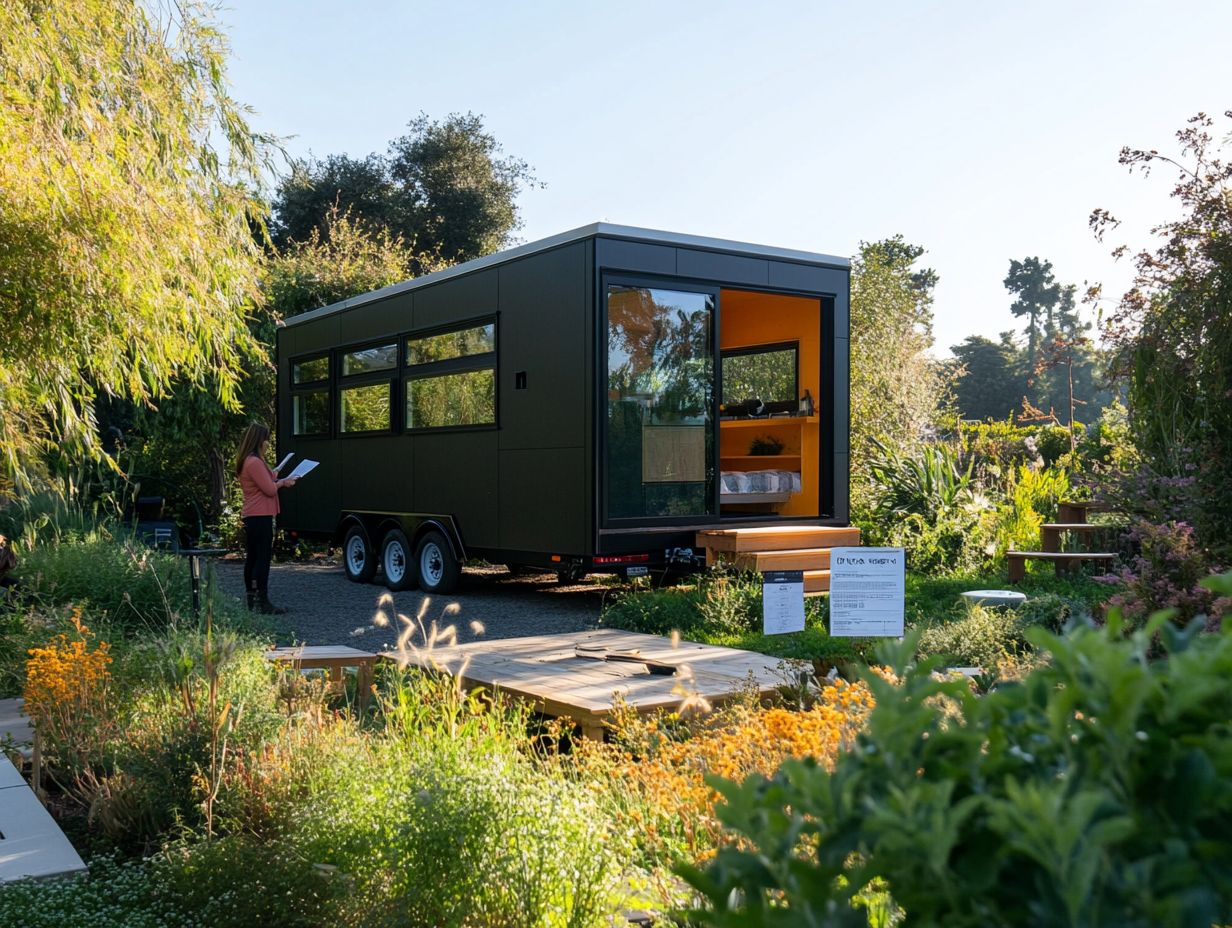
Understanding zoning and building codes is essential for anyone wanting to place a tiny house on wheels, especially concerning the minimum square footage requirements. These regulations dictate where and how tiny homes can be situated within various jurisdictions, including Maryland, affecting land use and neighborhood standards.
You’ll need to navigate the International Residential Code and local zoning ordinances carefully to ensure compliance and a smooth installation process for tiny house trailers. For those considering a tiny home, it’s crucial to be aware of tiny house legal resources you should know. In regions like Montgomery County, Baltimore County, and Garrett County, the rules can vary significantly, impacting your property rights and overall homeownership experience.
For example, Montgomery County may impose strict setbacks and density requirements that could complicate establishing a tiny house community or using recreational vehicles. In contrast, Baltimore County might offer more lenient policies designed to encourage alternative housing solutions that promote eco-friendly construction.
Garrett County may prioritize environmental considerations, influencing where you can place your tiny home, particularly regarding safety regulations. These varying regulations can present challenges for prospective homeowners navigating the complexities of building permits and zoning ordinances.
It’s crucial for anyone interested in tiny living to thoroughly research and understand the implications of these zoning codes and construction standards before making any decisions. For more information, check out tiny house construction legalities to ensure you are well-informed and prepared for your tiny house journey!
In conclusion, the advantages of tiny homes extend beyond financial savings to a richer lifestyle. Understanding tiny house land use laws is key to a successful tiny living experience. Don’t miss out on the opportunity to consult with a tiny house expert or start your tiny house plan today!
Permit Requirements
Obtaining the necessary permits to place a tiny house on wheels involves a careful step-by-step process that varies depending on local authorities and regulations in Maryland. Understanding these permit requirements is crucial for ensuring a seamless installation and legal compliance.
Your journey begins by determining the specific zoning regulations in the area where you plan to place your tiny house, including those related to tiny house trailers and mobile homes. You’ll need to distinguish between temporary and permanent placements, as each category demands different documentation and approvals aligned with local zoning ordinances. For a deeper understanding, refer to understanding tiny house zoning laws. Temporary permits typically accommodate short-term stays, such as in RV parks, while permanent placements may require more rigorous inspections and ongoing compliance checks.
When you talk to local zoning officers early in the process, you can gain valuable clarity and guidance through the often complicated application process. Be prepared with required documents such as site plans, proof of utility connections, and safety inspections. These can significantly streamline your application for obtaining building permits.
Steps to Legally Place Your Tiny House on Wheels
Placing your tiny house on wheels legally demands a careful approach, beginning with in-depth research into local regulations and concluding with the proper installation of your tiny home on a suitable foundation. This ensures compliance with local building codes.
Every step in this process is crucial to facilitate a smooth transition into the rewarding lifestyle of tiny living, which emphasizes compact size and minimalistic living.
Researching Local Regulations
Researching local regulations is an essential first step in placing your tiny house on wheels. By understanding the specific zoning ordinances and building codes in your area, you can sidestep potential legal complications related to tiny house laws. Check with your local county regulations, as each may have unique requirements concerning construction standards and safety regulations.
To effectively navigate these intricate regulations, utilize government websites that provide up-to-date information on zoning laws and tiny house regulations. Don’t hesitate to reach out to local authorities for clarification on any questions you may have regarding building permits and zoning codes, including the legal implications of tiny house ownership.
Engaging with tiny house communities can also provide invaluable insights, as members often share their experiences and best practices for overcoming regulatory hurdles. Familiarizing yourself with local zoning laws and building codes not only ensures compliance but also enables you to make well-informed decisions about your living situation, especially when considering legal considerations for tiny house rentals and tiny house trailers.
Obtaining Necessary Permits
Obtaining the necessary permits for placing your tiny house on wheels requires a solid grasp of the application process and the documentation that local authorities demand. Ensuring compliance with tiny house laws and building permits in your area is essential to sidestep any legal complications related to zoning regulations.
Gathering information is your key to moving forward. Typically, the application process kicks off with a detailed site plan that shows where your tiny house will be positioned and how it will connect to utilities. It’s also crucial to understand the legal risks of building a tiny house to ensure a smooth process.
It’s equally important to prepare for inspections by familiarizing yourself with the specific criteria you’ll need to meet, such as safety regulations, environmental considerations, and compliance with installation requirements. Many applicants face common hurdles, like misunderstandings about local zoning laws or delays in processing times.
To navigate these challenges effectively, staying organized and maintaining open lines of communication with local officials can be invaluable strategies. Act quickly to gather your documents and prepare for your tiny living adventure!
Hiring Professionals for Installation
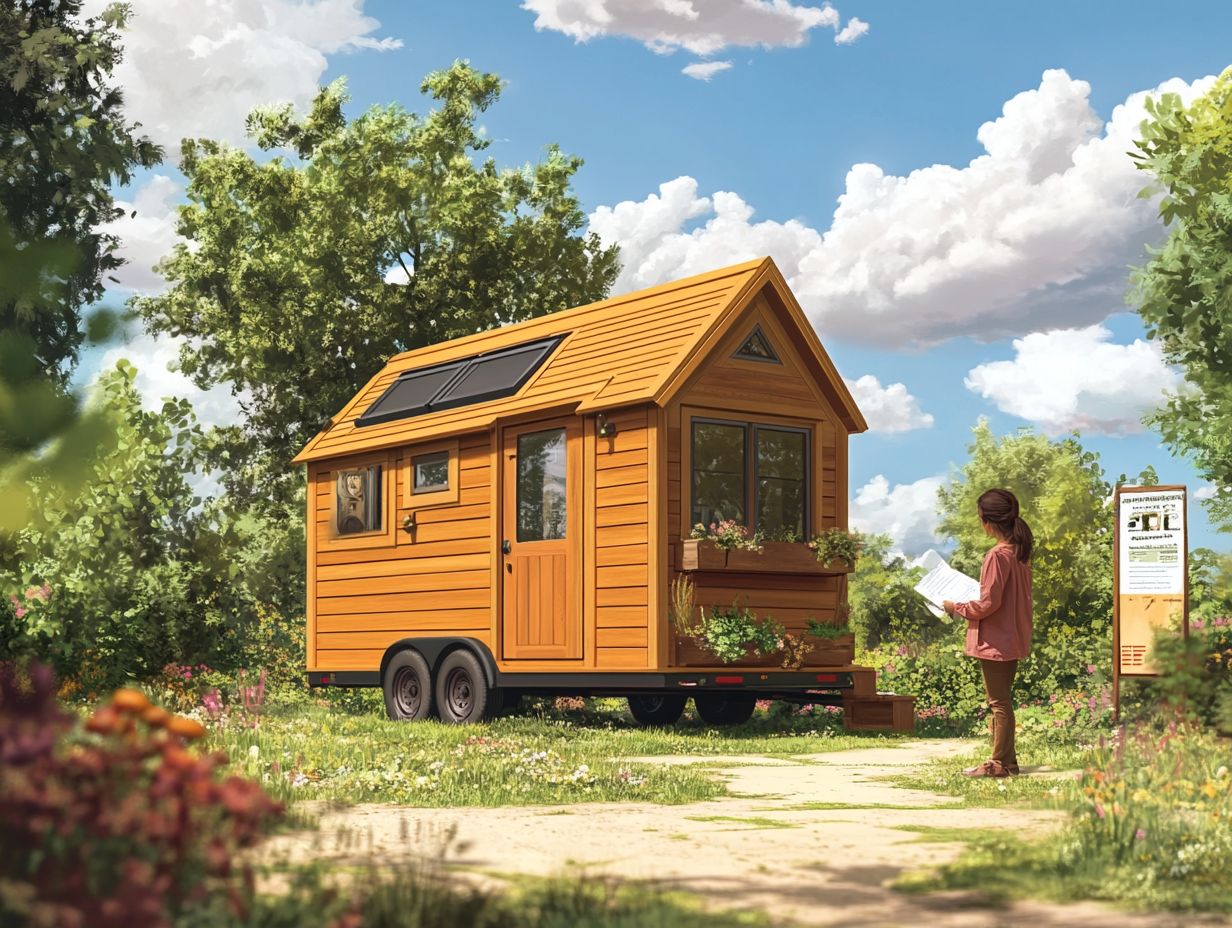
Hiring professionals for the installation of your tiny house on wheels is a savvy choice. Their expertise ensures that your home is correctly positioned on a suitable foundation and that all utilities are seamlessly connected. This alignment with local building codes and zoning regulations streamlines the entire process and minimizes the risk of potential hiccups.
When considering professionals, focus on tiny house builders specializing in tiny homes and small dwellings tailored to your needs. Electricians play a critical role in safely managing electrical systems, ensuring everything operates efficiently and without risk. Similarly, plumbers are essential for installing plumbing fixtures, making sure water supply and waste systems are properly integrated.
Choosing qualified individuals upholds safety standards and ensures compliance with construction codes and inspection requirements. This ultimately prevents costly adjustments or hazards later on. These experts understand the unique requirements of transitional structures like tiny houses, allowing you to focus on what truly matters: enjoying your new living space.
Alternative Options for Tiny House Living
Are you ready to embrace tiny living? Exploring alternative options for tiny house living opens up a world of possibilities beyond simply placing a tiny house on wheels. You might consider renting or purchasing land for your eco-friendly dwelling, joining established tiny house communities like Liberty Village or Blue Moon Rising, or settling in RV parks.
Each of these avenues presents unique benefits and challenges, catering to diverse lifestyles and preferences, such as minimalistic living, while remaining compliant with local zoning regulations.
Renting or Buying Land
Renting or buying land for your tiny house on wheels is a pivotal decision that directly influences your living situation. You must understand local regulations, including property rights and land use. This choice will determine not only the location of your home but also your ability to comply with zoning ordinances and building codes.
If you’re contemplating this lifestyle, conducting careful research is crucial to avoid potential pitfalls, especially regarding tiny house laws. Local governments often enforce specific regulations, influencing everything from where you can park your home to how long it can stay in one place. Understanding navigating tiny house community regulations can help you make informed decisions.
It’s wise to investigate existing property rights or easements which are legal rights to use the land of another and remain aware of any restrictions that might affect your decision. Familiarize yourself with permits needed for tiny house construction to significantly reduce the risks associated with land purchases. This will ensure a smoother transition into tiny living and protect you from costly complications in the future. Act now to secure your dream location before it’s gone!
Joining a Tiny House Community
Join a tiny house community and discover an exciting new way to live! You’ll have the chance to foster genuine relationships with like-minded individuals while collaboratively navigating local regulations and zoning ordinances. These communities typically offer a range of amenities and support systems that elevate your tiny living experience.
One of the standout advantages is access to shared resources, like communal gardens, laundry facilities, and recreational spaces within tiny house communities. Not only do these reduce your individual expenses, but they also cultivate a strong sense of teamwork among residents.
In these environments, you ll likely find robust support networks that encourage residents to exchange skills, tools, and knowledge, enriching your overall lifestyle. When searching for the right community, consider available amenities, such as Wi-Fi, parking options, and proximity to essential services.
Moreover, ensure the community adheres to local regulations and construction norms. You can usually verify compliance through community guidelines or by engaging in conversation with current residents.
Frequently Asked Questions
1. Can I legally place my tiny house on wheels on any type of land?
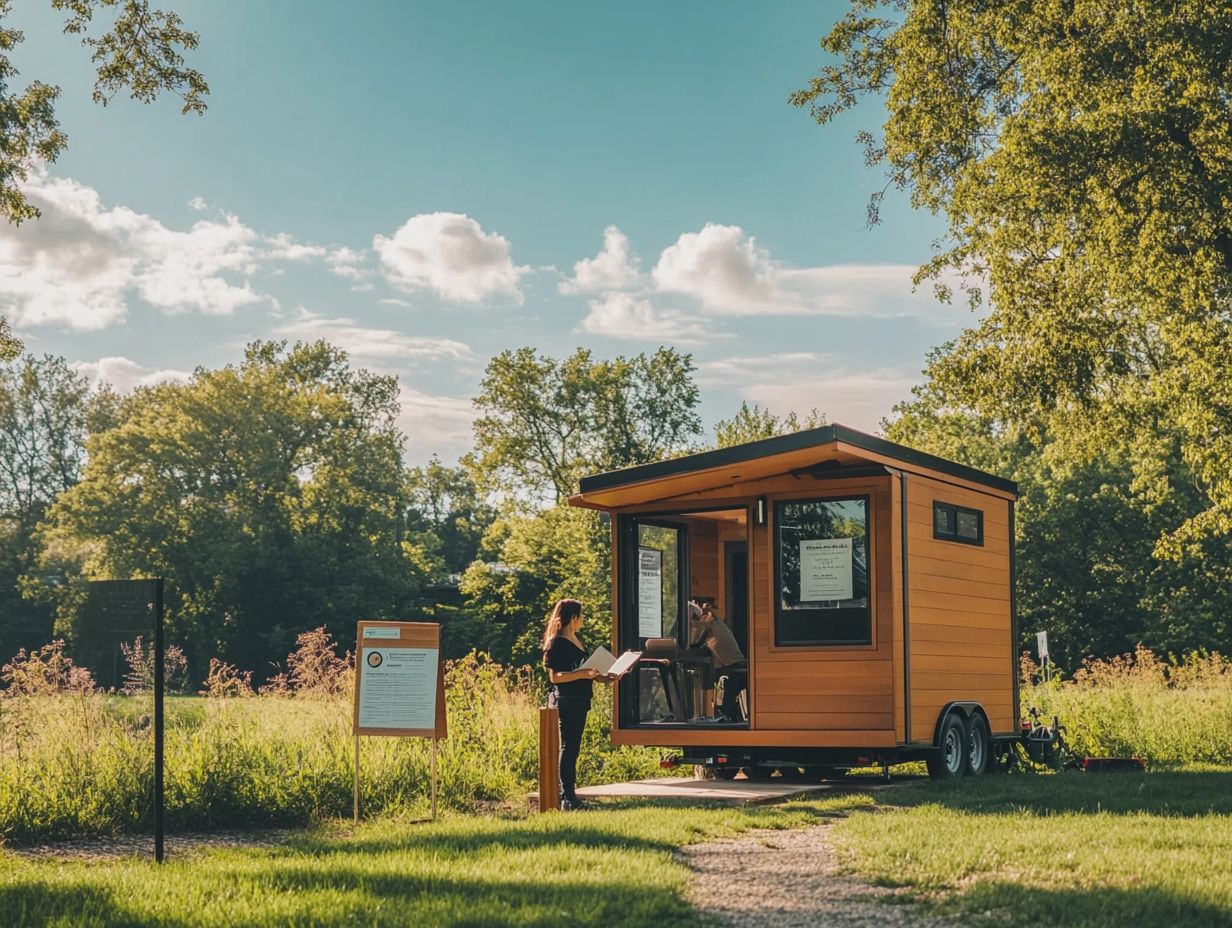
No, you cannot legally place your tiny house on wheels on just any land. Zoning and building codes dictate where you can place it.
2. Are there specific zoning regulations for placing a tiny house on wheels?
Yes, there are specific zoning regulations for placing your tiny house on wheels. These regulations vary by state and city, so researching your area is crucial.
3. Do I need a permit to place my tiny house on wheels on my property?
Yes, you will likely need a permit to legally place your tiny house on wheels on your property. Don’t miss out check with your local government for details.
4. Can I place my tiny house on wheels in a backyard or as an extra living space?
In some areas, yes, you can legally place your tiny house on wheels in a backyard or as extra living space. Make sure to check with your local government for the best outcome!
5. Are there any specific building code requirements for a tiny house on wheels?
Yes, there are specific building code requirements for a tiny house on wheels, which often align with the International Residential Code. These are rules that ensure buildings are safe and meet certain standards.
6. Can I legally live in my tiny house on wheels full-time?
This depends on the regulations in your area. Some places allow full-time living in a tiny house on wheels, while others permit it only as a temporary or vacation home.

